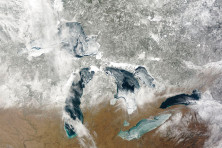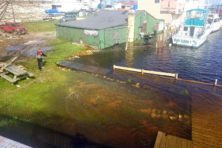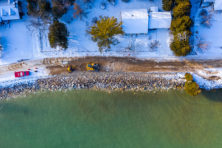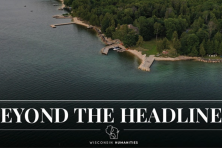Receding Lake Levels Spur Concerns
- Share
- Tweet
- Pin
- Share
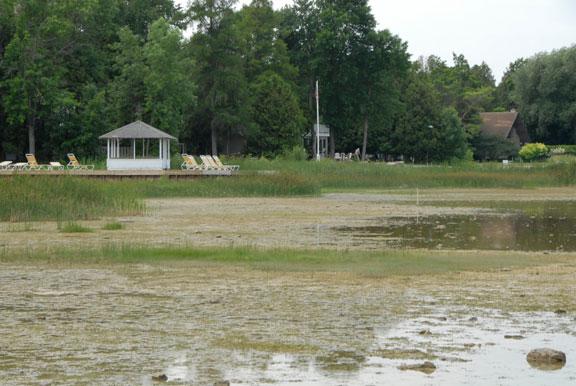
A guest on a Fox Valley radio station was discussing the increasing value of fresh water in a world where many areas face extreme shortages.
“It is being said more and more often that water is the oil of the future and the Great Lakes, the biggest freshwater body in the world, its biggest prize,” the guest said (he was gone before I caught his name). Nowhere are his words more poignant than in Door County, where thousands of tourists come each summer to enjoy the views of the water and the sandy beaches.
As officials in the county strive to revamp the tourism economy, the deterioration of recreational beaches is becoming an increasing concern. A review posted on Door County Navigator’s Web site illustrates the problem. “We thoroughly enjoyed out stay at the Edgewater,” reads a post from Terree J. “The only disappointment was the ‘beach.’ Navigator’s rave review about the awesome beach was the deciding factor in where to stay. But there is no beach.”
The water on Lake Michigan is so low that the Ephraim beach Terree is referring to, which used to be a family favorite bathing spot because of its sandy shallow waters, has transformed into a marshy area lined with rocks and tall weeds.
Kate, a restaurant manager from Chicago who’s been coming up for the past 30 years, can’t believe how low the water has fallen: “It’s so gross now, I don’t want to stay here.”
Terree and Kate are expressing what many fear may be a deciding factor in the evolution of the region’s economy. As water levels continue to drop, changing the coastline of the peninsula, many wonder whether they will rise again. A natural cycle? For years we have been hearing that the drop in water levels of the Great Lakes is a natural phenomenon.
According to Bill Schuster, head of the Door County Soil and Water Conservation Department, “lake levels do go up and down naturally, and we are clearly at a low period.” U.S. Corps of Engineers statistics show that Lake Michigan has had other low periods. In 1964 water levels dropped to an all time low of 175.78 meters (currently it is 176.06 meters) only to rise to just under 177 meters five years later.
But Jerry Viste, who’s been working for the Natural Resources Defense Council (NRDC) for the past 27 years, said more might be at work than the natural cycles of the lake. “We do have cycles, but this one might be longer because of all the other things that are happening,” he said. “And if it’s longer how long will it last, and will it rise again?”
The water level of the lake is dependent on two factors: precipitation in the form of rain or snow and evaporation from heat. According to Phillip Keillor, a coastal engineer specialist for Sea Grant at the University of Wisconsin, the water level will only change significantly if there is a prolonged shift in climate that reduces high precipitation and increases evaporation. According to the Great Lakes Environmental Research Laboratory, the recent decline in lake levels, its lowest since the ‘60s, could be linked to an “increase in evaporation during the warmer than usual temperatures we have had the past few years as well as the series of mild winters and below average snow cover.”
The question is, will these temperatures decrease in the near future and will our winters become as fierce as they once were? Global warming at play? Many scientists would beg to differ, as global warming becomes an acknowledged cause of the rapidly changing temperatures across the globe. According to the National Academy of Science, temperatures are rising faster than they have in 2,000 years and by the end of the century the Earth could be 3.2 to 7.2 degrees hotter than it is today. The Union of Concerned Scientists (UCS) agrees that winters in Wisconsin in a hundred years may feel more like those in Missouri today – five to ten degrees warmer. Summers could be drier with an increase in severe storms and droughts. Even if it rains more frequently, the UCS argues that water levels will continue to drop due to the higher rate of evaporation expected from hotter temperatures. If these predictions come true, “Lake Michigan water levels could drop as much as five feet in the next 100 years,” according to the UCS. This would put in jeopardy the fragile aquatic ecosystems and distinct wildlife dependent on a stable ecological niche for survival.
Although certain species will be capable of adapting, others will disappear or become extinct.
Impact on tourism and business
Many of Door County’s sandy beaches have already been transformed by wilder vegetation and the dropping water levels. Although the natural lake cycles are part of the cause, the changes we are currently experiencing are more extreme. Viste sees more than nature at work.
“The cycle is going down-hill because we are drawing more water out than we are putting back in,” he said.
As shores are lined with smelly algae and wild vegetation takes over the beaches, people are less inclined to visit and use them. The impact of diminished water quality and quantity will be difficult both for the local environment and the local economy. According to John Johnson, who, along with his family, runs Al Johnson’s Swedish Restaurant, “it hurts the tourism industry when beaches close” and the beaches are what keep people coming to this area. Indeed, much of Door County’s businesses and attractions revolve around the natural beauty of the region with restaurants and homes overlooking the bay, extensive water sports, boats and ferries, fishing, marinas, state parks and beaches.
The Door County economy depends on the ecosystems and natural resources particular to the Great Lakes region as well as its beautiful shorelines to attract visitors from around the country. If the water level of Lake Michigan falls 2.5 feet by 2030 as predicted by the NRDC, all of these businesses will be impacted. In the future tourists may choose a different destination for their summer vacation where they will be able to go to the beach with their children, fish with their friends and be less at risk for waterborne diseases, restrictions and extreme heat.
In Wisconsin, tourism is a top-income producing industry and generates nearly $13 billion a year. So what happens to that money if our lakes and beaches disappear? What will people come to Door County for? One needs only to look at Hedgehog Harbor in Garrett Bay to understand the impact of the change in water level. The Hedgehog Harbor boat launch is no longer in existence. The dock has been pulled out of the muddy sand and the water level is below the end of what used to be the launch.
No more dock. No more boats. No more fishing. No more people. For more information: Great Lakes Environmental Research Lab at the National Oceanic and Atmospheric Administration: http://www.glerl.noaa.gov Great Lakes Water Institute: http://www.glwi.uwm.edu Union of Concerned Scientists: http://www.ucsusa.org National Resources Defense Council: http://www.nrdc.org Environmental Protection Agency: http://www.epa.gov U.S. Army Corps of Engineers: http://www.lre.usace.army.mil

